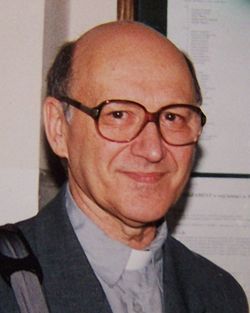
Born: March 12, 1936 Tarnow, Poland
Early days. Father, Kazimierz, was a chemical engineer, member of pre-WWII Poland's Minister Kwiatkowski's group of advisers. Mother, Zofia nee Strugalewicz, was a daughter of Polish estate owners in the Ukraine. In 1940 the Heller family was deported to Yakutsk region in Siberia. Later the Hellers were moved to a kolkhoz in Urbach near Saratov. Michal went there to the second and third grade of a local school. The Hellers returned to Moscice, Poland in 1946 and Michal finished there his primary education. In 1953 he passed the final exam at the Gimnazjum (high school) and entered the Theological Institute in Tarnow where he got his Master degree in Theology in 1959. He was ordained the same year. Michał Heller graduated from the Catholic University of Lublin, where he earned a master's degree in philosophy in 1965 and a Ph.D. in cosmology in 1966.
Career. After beginning his teaching career at Tarnow, he joined the faculty of the Pontifical Academy of Theology in 1972 and was appointed to a full professorship in 1985. In 1977 he has been a visiting professor at the Catholic University of Louvain in Belgium and a visiting scientist at Belgium's University of Liege, the University of Oxford, the University of Leicester, Ruhr University in Germany, The Catholic University of America, and the University of Arizona among others. Dr. Heller is, since 1981, a member of the Pontifical Academy of Sciences and member of Vatican's Observatory. In 1991 he became the President ('rektor') of the Theological Institute in Tarnow. His current research is concerned with the singularity problem in general relativity and the use of non-commutative geometry in seeking the unification of general relativity and quantum mechanics. He has published nearly 200 scientific papers not only in general relativity and relativistic cosmology, but also in philosophy and the history of science and science and theology and is the author of more than 20 books. In his most recent volume, Is Physics an Art? (Biblos, 1998), he writes about mathematics as the language of science and also explores such humanistic issues as beauty as a criterion of truth, creativity, and transcendence. In March of 2008, Heller was awarded the $1.6 million USD Templeton Prize for his extensive philosophical and scientific probing of "big questions." His works have sought to reconcile the "known scientific world with the unknowable dimensions of God." Heller plans on spending the prize money on the establishment of a research institute named after Nicholas Copernicus aimed at reconciling science and theology.
Prizes and awards. Pope's Honorary Prelate, 1994; Doctorate Honoris Causa AGH, Cracow, 1996; City of Tarnow Medal, 1996; member of St.Petersburg's Academy of History of Science and Technology, 1998; Copernicus Prize of Cracow's Polish Academy of Knowledge 2000; KUL's Radziszewski's Prize, 2000; Polish Science Fundation's Steinhaus Prize, 2001; Polish Prime Minister's Prize, 2006; Templeton's Prize, 2008.
Sources:
This article uses, among others, material from the Wikipedia article "Michal Heller" licensed under the GNU Free Documentation License. :
Wikipedia
Other sources:
Opoka (in Polish)- includes a list of his research papers
Templeton Prize- official website
The Christian Science and Monitor
Return to home page:
Prominent Poles